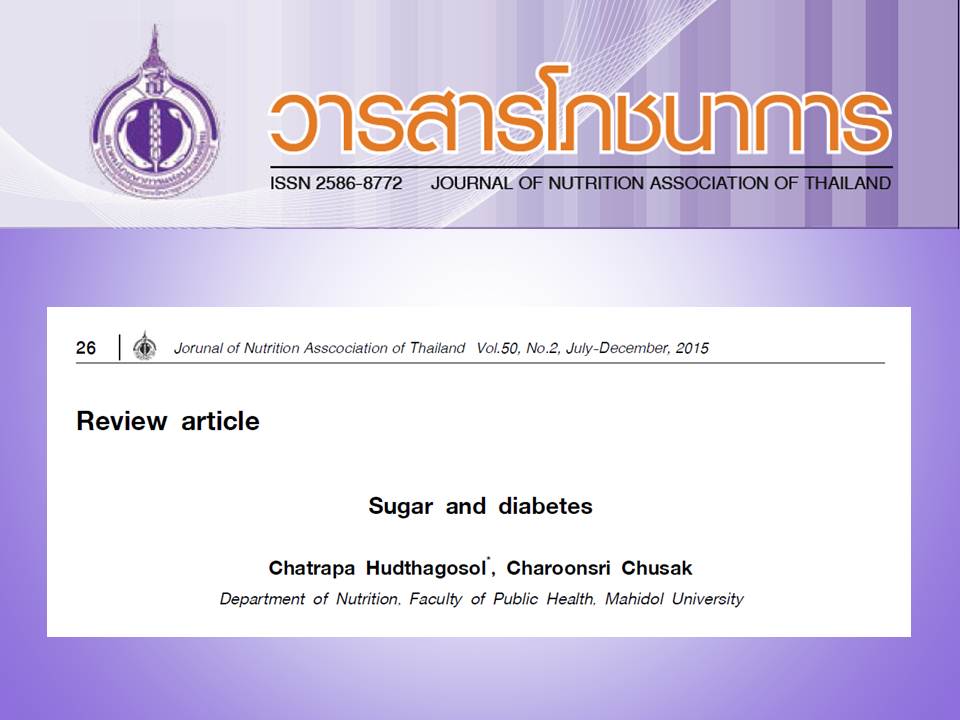Sugar and diabetes
Keywords:
Key word : Thailand Qualifications for Higher Education Framework for Graduate Program in Public Administration 2558 B.E ,Administration, ImpactAbstract
Sugar is known as a source of carbohydrate that can generate sweet taste to our food and
drink. Consumption of sugar has risen across the global including Thailand. Currently, a number of
studies including experimental, clinical and epidemiological studies has been indicated the relationship
of sugar or nutritive sweeteners consumption and risk of metabolic diseases. Excessive and usual
consumption of sugar may associate with the higher energy intake, weight gain and type 2 diabetes.
However, several food industries have developed the artificial or nonnutritive sweeteners to replace
sugar and even nutritive sweeteners. It appears to be increasing in the health awareness over time.
The purpose of artificial sweeteners is alternatives to reduce calories, weight gain and risk of some
metabolic diseases, whereas some evidence noted that consumption of artificial sweeteners may
concern about adverse effects. Therefore, more evidence is needed to confirm the acute and chronic
health effect of consumption of sugar and artificial sweeteners in the future.
References
2. Tandel KR. Sugar substitutes: health controversy over perceived benefits. J Pharmacol Pharmacother. 2011;2:236-43.
3. Roncal-Jimenez CA, Lanaspa MA, Rivard CJ, Nakagawa T, Sanchez-Lozada LG, Jalal D, et al. Sucrose induces fatty liver and pancreatic inflammation in male breeder rats independent of excess energy intake. Metab Clin Exp. 2011;60:1259-70.
4. Bjornstad P, Lanaspa MA, Ishimoto T, Kosugi T, Kume S, Jalal D, et al. Fructose and uric acid in diabetic nephropathy. Diabetologia. 2015;58:1993-2002.
5. de Matos Feijó F, Ballard CR, Foletto KC, Batista BA, Neves AM, Ribeiro MF, et al. Saccharin and aspartame, compared with sucrose, induce greater weight gain in adult Wistar rats, at similar total caloric intake levels. Appetite. 2013;60:203-7.
6. Foletto KC, Batista BA, Neves AM, de Matos Feijó F, Ballard CR, Ribeiro FM. Sweet taste of saccharin induces weight gain without increasing caloric intake, not related to insulin-resistance in Wistar rats. Appetite. 2016;96:604-10.
7. Al-Saleh AM, Corkey B, Deeney J, Tornheim K, Bauer E. Effect of artificial sweeteners on insulin secretion, ROS, and oxygen consumption in pancreatic beta cells. FASEB J. 2011;25:530-1.
8. Hawkins M, Gabriely I, Wozniak R, Vilcu C, Shamoon H, Rossetti L. Fructose improves the ability of hyperglycemia per se to regulate glucose production in type 2 diabetes. Diabetes. 2002;51:606–14.
9. Black RNA, Spence M, McMahon RO, Cuskelly GJ, Ennis CN, McCance DR, et al. Effect of eucaloric high-and low-sucrose diets with identical macronutrient profile on insulin resistance and vascular risk: a randomized controlled trial. Diabetes. 2006;55:3566-72.
10. Melanson KJ, Zukley L, Lowndes J, Nguyen V, Angelopoulos TJ, and Rippe JM. Effects of high-fructose corn syrup and sucrose consumption on circulating glucose, insulin, leptin, and ghrelin and on appetite in normal-weight women. Nutrition. 2007;23:103-12.
11. Lê KA, Ith M, Kreis R, Faeh D, Bortolotti M, Tran C, et al. Fructose overconsumption causes dyslipidemia and ectopic lipid deposition in healthy subjects with and without a family history of type 2 diabetes. Am J Clin Nutr. 2009;89:1760-5.
12. Jameel F, Phang M, Wood LG, Garg ML. Acute effects of feeding fructose, glucose and sucrose on blood lipid levels and systemic inflammation. Lipids Health Dis. 2014;13:1-7.
13. Anton SD, Martin CK, Han H, Coulon S, Cefalu WT, Geiselman P, et al. Effects of stevia, aspartame, and sucrose on food intake, satiety, and postprandial glucose and insulin levels. Appetite. 2010;55:37-43.
14. Steinert RE, Frey F, Töpfer A, Drewe J, Beglinger C. Effects of carbohydrate sugars and artificial sweeteners on appetite and the secretion of gastrointestinal satiety peptides. Br J Nutr. 2011;105:1320-8.
15. Sørensen LB, Vasilaras TH, Astrup A, Raben A. Sucrose compared with artificial sweeteners: A clinical intervention study of effects on energy intake, appetite, and energy expenditure after 10 wk of supplementation in overweight subjects. Am J Clin Nutr. 2014;100:36-45.
16. Janket SJ, Manson JE, Sesso H, Buring JE, Liu S. A prospective study of sugar intake and risk of type 2 diabetes in women. Diabetes Care. 2003;26:1008-15.
17. Schulze MB, Manson JE, Ludwig DS, Colditz GA, Stampfer MJ, Willett WC, et al. Sugar-sweetened beverages, weight gain, and incidence of type 2 diabetes in young and middle-aged women. JAMA. 2004; 292:927-34.
18. Schulze MB, Hoffmann K, Manson JE, Willett WC, Meigs JB, Weikert C, et al. Dietary pattern, inflammation, and incidence of type 2 diabetes in women. Am J Clin Nutr. 2005;82:675–715.
19. Montonen J, Järvinen R, Knekt P, Heliö vaara M, Reunanen A. Consumption of sweetened beverages and intakes of fructose and glucose predict type 2 diabetes occurrence. J Nutr. 2007;137:1447–54.
20. Bazzano LA, Li TY, Joshipura KJ, Hu FB. Intake of fruit, vegetables, and fruit juices and risk of diabetes in women. Diabetes Care. 2008;31:1311–7.
21. Odegaard AO, Koh W-P, Arakawa K, Yu MC, Pereira MA. Soft drink and juice consumption and risk of physiciandiagnosed incident type 2 diabetes: the Singapore Chinese health study. Am J Epidemiol. 2010;171:701–8.
22. Chen L, Hu FB, Yeung E, Willett W, Zhang C. Prospective study of pre-gravid sugar sweetened everage consumption and the risk of gestational diabetes mellitus. Diabetes Care. 2009;32:2236–41.
23. de Koning L, Malik VS, Rimm EB, Willett WC, and Hu FB. Sugar-sweetened and artificially sweetened beverage consumption and risk of type 2 diabetes in men. Am J Clin Nutr. 2011;93:1321–7.
24. The InterAct consortium. Consumption of sweet beverages and type 2 diabetes incidence in European adults: results from EPIC-InterAct. Diabetologia. 2013;56:1520–30.
25. Lana A, Rodŕ guez-Artalejo F, Lopez-Garcia E. Consumption of sugar-sweetened beverages is positively related to insulin resistance and higher plasma leptin concentrations in men and non-overweight Women. J Nutr. 2014;144:1099–105.
26. Imamura F, O’Connor L, Ye Z, Mursu J, Hayashino Y, Bhupathiraju SN, Forouhi NG. Consumption of sugar sweetened beverages, artificially sweetened beverages, and fruit juice and incidence of type 2 diabetes: Systematic review, meta-analysis, and estimation of population attributable fraction. BMJ. 2015;351:h3576.

Downloads
Published
How to Cite
Issue
Section
License
Upon acceptance of an article, copyright is belonging to the Nutrition Association of Thailand.


